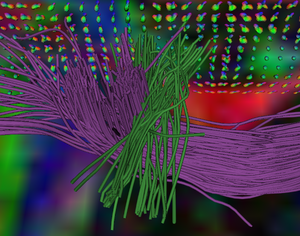GPU-Accelerated Geodesic Fiber Tracking for HARDI Data using CUDA
Facts
| Type | master project | |
|---|---|---|
| Place | internal | |
| Supervisor | Neda Sepasian (BMT), Andrei Jalba, Huub van de Wetering | |
| Student | Mark Hesselberth | |
| start/end date | - 12/2016 | |
| Thesis | download |
Description
In order to non-invasively investigate white matter tracts in a human brain, Diffusion Weighted MRI (DW-MRI) is used as a method to measure water molecule diffusion. Diffusion patterns give information on tissue structure, such as local white matter fiber direction. Many fiber tracking techniques have been introduced to reconstruct the neural tracts from this DW-MRI data. Multi-valued geodesic fiber tracking computes fiber paths as shortest paths through a curved space. While this technique supports complex fiber structures, it suffers from poor performance. We therefore designed and implemented a highly-parallel variant of the geodesic fiber-tracking algorithm using the CUDA language as a plug-in for the vIST/e tool. This implementation can reduce the tracking time from up to five minutes to under thirty seconds. In addition, we introduce a novel correction method, inspired by the physical concept of refraction, which reduces the amount of false positives in the algorithm's output by constricting the fibers to bundles where the diffusion is highly anisotropic. Finally, we introduced a CUDA-accelerated method to compute Ricci scalars, an intrinsic curvature, as a lower-dimensional descriptor of a fiber. This could be used as a starting point for research into the use of machine learning in processing the output of tractography methods.
Links
* vIST/e
